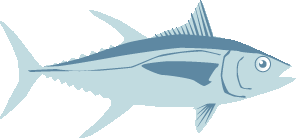Overview
The Indonesia Western and Central Pacific Ocean yellowfin tuna - handline (IPNLF) FIP, aims to meet sustainability criteria for MSC certification through a process of implementing a Fishery Improvement Project, and assist these fisheries to better meet international market requirements. An MSC pre-assessment was completed in 2018 (Hough Associates), a FIP action plan was developed for associated Units of Assessement (UoAs) in November 2019, and the FIP is subject to regular review.
Together, the International Pole & Line Foundation (IPNLF) with FIP partners PT. Deho Canning and PT. Citraraja Ampat Canning (CRA), are driving the FIP with fishery stakeholders. An assessment was conducted on PT. Deho Canning and PT. CRA supply-chains that identified at least 2 Units of Assessment (UoAs) in Sorong and Bitung, to implement a FIP and move towards MSC certification. A national FIP Steering Committee, led by the Ministry of Marine Affairs and Fisheries (MMAF) via a decree issued by the Director of Fishery Resource Management (2016), which is a platform for all tuna FIPs in Indonesia to engage with government. The FIP Steering Committee meets regularly and provides a vehicle for cross-sector collaboration to achieve sustainability objectives.
Indonesia has a long tradition of catching tuna using handlines. Through the FIP, PT Deho Canning, PT CRA and IPNLF are committed to promoting and supporting these fisheries, which are widely regarded as one of the most ecologically and socially responsible methods to harvest tuna. Handline tuna fisheries are typically ‘green-rated' by NGOs and form a core component of many major buyers’ sourcing commitments.
The FIP aims to increase knowledge about and application of international sustainability standards, to improve cross-sector collaboration, enhance fishery transparency and traceability, and advance the implementation of national and regional conservation management measures. Through this initiative, IPNLF, PT Deho Canning, PT Citraraja Ampat Canning, and its partners will demonstrate the benefits of a well-managed Indonesian fishery for food security, livelihoods, and sustainable businesses.
The Indonesia Western and Central Pacific Ocean yellowfin tuna - handline (IPNLF) FIP, aims to meet sustainability criteria for MSC certification through a process of implementing a Fishery Improvement Project, and assist these fisheries to better
This fishery improvement effort seeks to achieve the following objectives by the end of 2025:
- Implement a work plan to transition these fisheries to operate on par with an unconditional pass of the MSC standard within the prescribed 5-years;
- Establish and promote industry best practices for Indonesian handline and one-by-one tuna fisheries;
- Support cross-sectorial collaboration that advances the implementation of national and regional sustainable management measures;
- Increase transparency of Indonesian handline tuna fishery supply chains;
- Improve market demand and market access for Indonesia's handline tuna fisheries;
- Demonstrate the benefits of well-managed fisheries that support the livelihoods of coastal communities and sustainable businesses.

